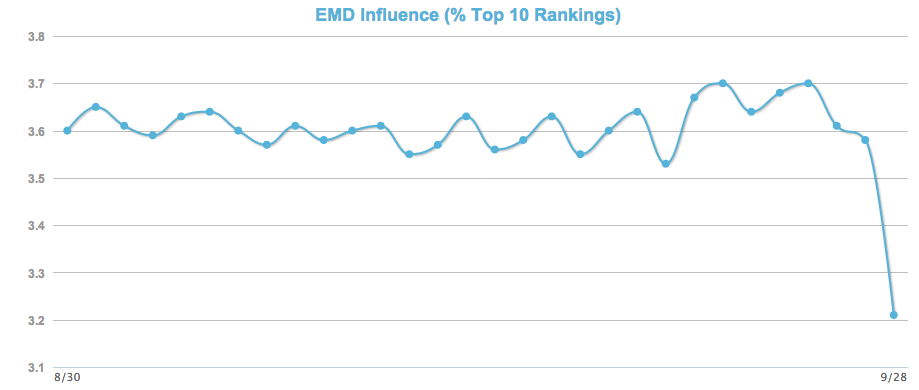Yet again parts of our industry are under fire from algorithmic changes at Google.
The focus right now are Exact Match Domain’s (EMD), something that us SEO’s have complained about for years.
I’ve lost count of the amount of times that I’ve seen an SEO moan that they site can’t outrank “buycheapbluewidgets.com” or whatever it may be, just because its an exact match.
Thing is, those of us complaining about it were only ever doing so, as our issue was our loss of profit – to a site we considered to be less worthy than our own!
That’s a heck of a double standard if you ask me..
So – what happens now then?
Well, early evidence suggests that the average position for EMDs across a large dataset has dropped quite significantly on average. The thing with that dataset (mozcast.com incidentally) is that it only checks the top 10 results for any given key phrase so its harder to get a more accurate picture from it, but the graph above does illustrate a fairly big swing.
Its as if your EMD was just nuked by Google.
Now this is something I have a problem with.
Most of my good domains historically have always been close, if not exact matches. I’ve always however married them to good content, and have enough of a grasp on technical SEO to ensure no bloopers, and as for linkbuilding… well – I can throw a link or two around when I need to.
What’s really bothering me though is the absolute intent here. The sites that have benefitted from this are pure informational sites, Wikipedia has (somehow) managed to increase in visibility on my dataset, and lots of really random blog based sites seem to be getting more juice out of this.
A similar pattern occurred in 2010 with MayDay, which was pretty much reversed by early October – but it proved that returning informational sites only was a mistake.
Listen Google:
A lot of the time, people doing searches where EMDs will appear, were looking for that exact service or product. Duh.
So someone went to the effort of buying a domain and building a site around it? Good for them!!
They are probably trying to monetize it by providing the service that is relevant to what the person was looking for. That being the case its your job Google to rank that site, and rank it well.
If its not the case, and they’ve done a shitty job, then fine, but use metrics you’ve actually got a better grip on – like monitoring toolbar usage for obvious signs of doorway sites and just upvote the destination site, that’d sort out the .info spammy EMD’s – if you just counted them like a link.
Alternatively, just set the trigger on people returning to search and refining their term after clicking through on that result. Actually, if we could have more of that in the whole index, I’d be grateful thanks.
When is an EMD not an EMD?
When it gets triggered for queries that aren’t the domain name of course.
Looking through my data, I’m seeing lots of scalpel like precision drops for exact matches, but guess what – in circumstances where the same site ranked for other terms, those appear to be doing just fine.
That’s not on Google sorry, it’s a really crappy solution to a problem that never really existed, unless you were an SEO complaining about the strength they used to hold.
I for one am perfectly happy with exact matches remaining powerful – at the very least you know they are going to be relevant.



